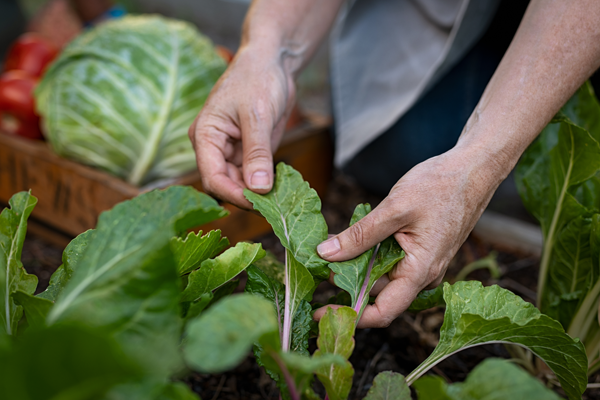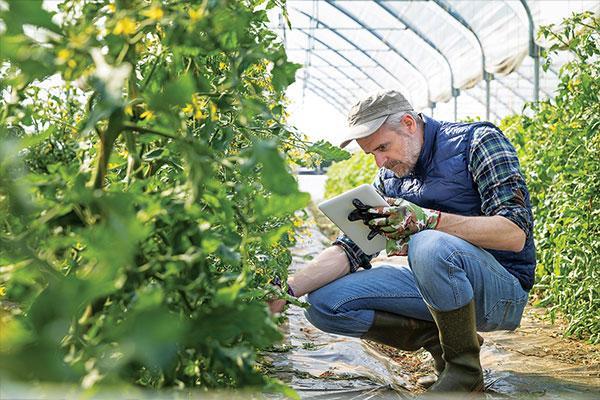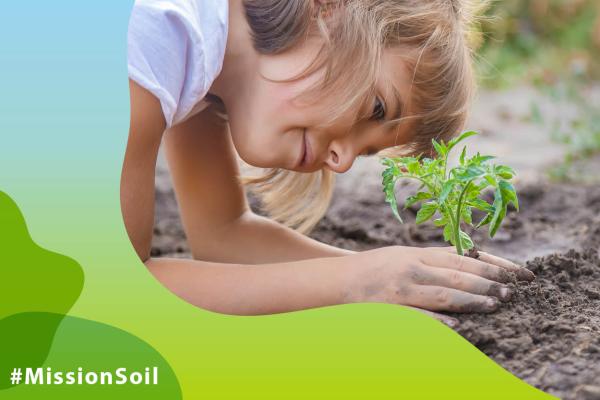Soil is an essential, non-renewable resource for agriculture, providing the basis for the production of food, fibre, and other resources for a circular bio-economy.
Soil also supports biodiversity, plays a central role in carbon sequestration and storage, and provides a number of other ecosystem services, such as water regulation and nutrient cycling.
To protect these vital functions and ecosystem services, the common agricultural policy (CAP) supports sustainable soil and land management.

Soil and agriculture in the EU
With farmland accounting for roughly 50% of the EU’s surface area, agriculture is closely linked with soil health. However, soil in the EU is facing a number of challenges, including erosion, degradation, and desertification, as well as a decline in organic matter and loss of biodiversity.
Many of the issues threatening soil health are related to agriculture and the pressure to meet rising food demands, such as:
- degradation and decline caused by intensive practices;
- compaction under heavy machinery and inappropriate agronomic land cultivation practices;
- damage to biodiversity caused by monocultures and other land use and management practices;
- pollution from chemicals (for example pesticides, heavy metals, pharmaceuticals, plastics, etc.);
- land abandonment and neglect.
In order to address these challenges, the CAP ensures that agriculture is in line with the EU’s soil protection policies, as set out in the current soil thematic strategy. Sustainable soil management is also essential for many strategies and priorities of the European Green Deal, including:
- the farm to fork strategy;
- the zero pollution action plan;
- the ambitions for climate change mitigation and adaptation;
- the biodiversity strategy, which includes the EU soil strategy;
- and the organic action plan.

- Press release
European Green Deal: more sustainable use of plant and soil natural resources
CAP actions
Through a variety of rules and measures, the CAP aims to safeguard the role of soil within sustainable systems of agriculture in the EU, enabling farmers to:

provide safe, healthy, and sustainably-produced food for society;

earn a stable and fair income, taking into account the additional public goods they provide;

protect natural resources, enhance biodiversity, and contribute to the fight against climate change.
The CAP 2023-27 entered into force on 1 January 2023. It includes stronger support for healthy soil, in line with the goals of the European Green Deal.
CAP specific objectives
The CAP 2023-27 is built around ten specific objectives. The sustainable management of soil is a crucial component of several objectives, in particular those focused on landscapes and biodiversity, natural resources, and climate action.
CAP Strategic Plans
In their CAP Strategic Plans, EU countries have more flexibility to design interventions that tackle the most pressing challenges facing their soils, whilst also contributing to shared EU goals.
EU countries’ CAP Strategic Plans combine a wide range of targeted interventions to address their specific needs and deliver tangible results.
The plans must contribute to, and be consistent with, EU legislation and commitments relating to climate and environment.

Conditionality
Under conditionality rules, beneficiaries of the CAP have their payments linked with a set of statutory management requirements (SMRs) and good agricultural and environmental conditions (GAECs). Conditionality rules of particular relevance to soil include:
- maintenance of soil organic matter and soil structure through a ban of burning arable stubble (GAEC 3);
- minimum land management to limit erosion (GAEC 5);
- minimum soil cover capacity (by green cover or stubble maintenance) (GAEC 6);
- preservation of the soil potential through crop rotation (GAEC 7).
Eco-schemes
Under current CAP rules, eco-schemes support farmers who adopt or maintain farming practices that contribute to EU environmental and climate goals. Through eco-schemes, the EU rewards farmers for preserving natural resources and providing public goods, which are benefits to the public that are not reflected in market prices and include practices that support sustainable soil management.
Eco-schemes can for example support soil management practices such as enhanced crop diversification, reduced tillage, catch crops, agro-forestry and other practices which help to improve soil structure and build up soil organic matter. Practices to improve nutrient management and the sustainable use of pesticides can also be supported by eco-schemes to improve soil health.
Rural development
Rural development includes interventions that support a sustainable soil management.
In their CAP Strategic Plans, EU countries can contribute to sustainable soil management through agri-environment-climate commitments (AECCs), in which farmers commit to management practices that protect and enhance soil or prevent soil degradation.
EU countries can apply several other rural development interventions to encourage sustainable soil management:
- measures to support organic farming help to safeguard soil health and biodiversity;
- measures to support forestry development are effective against soil erosion;
- investment measures can be used to finance machinery for conservation tillage – to minimise breaking-up of the soil and to maintain a high level of soil cover in autumn and winter, thus potentially limiting GHG emissions, reducing erosion and building up soil organic matter;
- measures to support knowledge transfer, advisory services and cooperation can help farmers to address various soil threats - like erosion, acidification or loss of organic matter – and foster the adoption of sustainable soil management practices adapted to local agro-ecological and farming conditions.
The European (EU) CAP Network also facilitates the sharing of ideas and good practices through thematic areas on resource efficiency and water and soil management.
Green architecture
A new green architecture for the CAP 2023-27 incorporates stronger rules and offers more opportunities for biodiversity-friendly farming. For example, an extra portion of the CAP’s budget is set aside for eco-schemes, which can support voluntary practices undertaken by farmers. At the same time, EU countries are obliged to reserve at least 35% of their Rural Development budget to environment and climate practices.

- General publications
- 26 June 2023
This document provides a detailed overview of the 27 EU members’ key elements and choices in their approved national plans. It also responds to requests for information to summarise what plans contain and aim to deliver.
Farm Sustainability Tool for nutrients
Within the framework of providing farm advisory services, EU countries will make available for farmers a digital Farm Sustainability Tool for nutrients (FaST) from 2024 at the latest.
The FaST will combine data and manual input from farmers to provide customised recommendations on crop fertilisation through a nutrient management plan. In addition, support for rural development will continue to fund land management payments, investments, knowledge-building, innovation and co-operation relevant to nutrient management.
Monitoring progress
Through the common monitoring and evaluation framework (CMEF), the Commission collects a wide range of indicators to measure the progress of the CAP in reaching its policy objectives. The Commission’s agri-food data portal includes a soil dashboard, which presents some of the most relevant indicators for soil.
The CMEF also provides a framework for evaluations and external studies. In November 2020, the Commission published an independent study on the impact of the CAP on the sustainable management of soil, conducted by Alliance Environment GEIE.
The CAP 2023-27 also includes a reinforced performance monitoring and evaluation framework (PMEF), which will facilitate greater accountability and the transition to a performance-based delivery model.
Knowledge, research, and innovation
Developing knowledge, research and innovation is essential to advance the possibilities of sustainable soil management.
The farm advisory system (FAS) advises farmers on how to apply sustainable soil management on their farms, comply with rules for soil protection, benefit from support available under rural development, as well as spreading knowledge of new methods and technology.
Research and innovation
The Commission also supports research and innovation to better understand the impact of agriculture and forestry on soils, as well as to develop new techniques and technologies that can progress soil-enhancing production systems. In particular, the Commission is proposing novel approaches to research and innovation, in combination with education, training, investments, and demonstration of good practices using “living labs” and “lighthouses” projects, through the Horizon Europe Mission 'A Soil Deal for Europe'.
European Innovation Partnership for Agricultural productivity and Sustainability
The European Innovation Partnership for Agricultural productivity and Sustainability (EIP-AGRI) remains a key instrument of the future CAP to promote the creation, testing and dissemination of innovative solutions achieved through the work of Operational Groups. These Operational Groups connect farmers, foresters, researchers, advisors, businesses and environmental NGOs to work together in innovative projects in agriculture and other activities related to farming and rural areas.
 Research in action: digitalisation
Research in action: digitalisationDigitalisation can enable farmers to improve soil fertility and reduce pollution by supporting better management systems. For example, precision agriculture uses digital location monitoring for the targeted application of nutrients and pesticides, while satellite guidance systems make it possible to use permanent pathways, known as Controlled Traffic Farming (CTF). Due to reduced compaction of the upper soil layer, the water and air regime in the soil improves, allowing for more stable yields during periods of drought and heavy rainfall.


